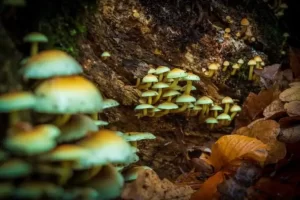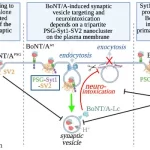Can Mushrooms Be the Answer to Depression? One Psilocybin Dose Shows Potential in Rewiring the Depressed Brain
Could the secret to revolutionizing mental health treatment be hidden within the mystical realms of mushrooms? The scientific world is buzzing with excitement as it delves into the psychedelic depths of psilocybin, the active component found in magic mushrooms, to explore its potential therapeutic impact on depression, anxiety, and other psychiatric disorders.
The journey to understand this once stigmatized and illegal compound is not just about altering perceptions but about altering lives, offering a beacon of hope to those ensnared in the clutches of relentless mental afflictions. The unfolding chapters of research are painting a narrative of promise and possibility, hinting at a future where the mysterious world of mushrooms could be a key to unlocking mental well-being and healing.
What Is Psilocybin?
Psilocybin is a naturally occurring psychoactive substance found in certain varieties of mushrooms, commonly known as “magic mushrooms.” It’s renowned for its ability to alter mood, cognition, and perception, acting primarily on specific serotonin receptors in the brain, notably the 5-HT2A receptor. This interaction with serotonin receptors can lead to profound changes in consciousness, allowing for potential therapeutic growth and altered states of reality, often termed as a “trip.”
The therapeutic potential of psilocybin is gaining increased recognition in the scientific community, with ongoing research exploring its efficacy in addressing various mental health conditions. The compound’s ability to create significant shifts in mood and perspective has placed it at the forefront of psychedelic research, showing promise particularly in the treatment of mental health disorders like depression. However, the use and research of psilocybin have faced limitations due to its classification as a Schedule I drug, marking it as having a high potential for abuse and no accepted medical use.
A Journey Through Research: Early Findings to Recent Breakthroughs
The scientific exploration of psilocybin began as early as the 1940s, exploring its potential as a psychedelic medicine to address an array of psychiatric ailments. However, the research trajectory was abruptly halted in the 1970s when psilocybin was categorized as a Schedule I drug and declared illegal, hindering the scientific and medical exploration of its potential benefits.
Resurgence of Interest and Contemporary Studies
Over the last decade, a resurgence of interest has sparked new, more advanced research into psilocybin and its potential as a therapeutic agent for mental health conditions. Recent studies, including those from reputable institutions like Johns Hopkins University, have demonstrated the efficacy of psilocybin in relieving symptoms of major depressive disorder for up to a month, opening up new horizons in the treatment of psychiatric conditions.
A 2021 study published in Neuron revealed that a single dose of psilocybin could potentially regrow neuronal connections lost in depression, highlighting its ability to remodel the brain and correct neurological deficits associated with the condition. The study noted a significant increase in dendritic spines, a crucial element in neuronal communication, within 24 hours of administering the compound to mice, with improvements enduring one month later.
Progress and Promising Results
Recent research published in February 2022 further supported the therapeutic efficacy of psilocybin. This study indicated that treatment with psilocybin, under controlled conditions and with adequate preparatory and integrative psychotherapeutic support, can lead to substantial and enduring improvements in depressive symptoms. It reported significant and enduring improvements in depression severity even up to 12 months post-treatment, expanding the horizon of psilocybin’s potential benefits.
Such advancements in research provide a beacon of hope for developing innovative treatments for conditions that have been historically challenging to address effectively with the existing array of psychiatric medications. While these findings hold promise, there remains the need for larger-scale, more inclusive research paramount to establish the clinical applicability and safety of psilocybin-based treatments.
How Would a Psilocybin Therapy Work?
Embarking on a journey with psilocybin is not merely about ingesting a substance; it’s a multifaceted therapeutic process necessitating meticulous preparation, structured support, and profound introspection. It offers an immersive exploration of the psyche, aiming to facilitate long-lasting positive transformations.
Rigorous Preparatory Measures: In clinical studies, psilocybin therapy commences with extensive preparatory meetings, lasting six to eight hours, involving two treatment facilitators. These sessions are crucial in building rapport, setting intentions, addressing concerns, and establishing a sense of safety and trust between the facilitators and the participants.
Guided Psychedelic Sessions: Following the preparation, participants partake in psychedelic sessions where psilocybin is administered in a controlled, supportive environment, overseen by the two therapists. The session, lasting approximately eight hours, is designed to provide a secure space for participants to experience, navigate, and reflect on the psychedelic state, promoting deep psychological insight and emotional release.
Integrative Post-Session Follow-ups: After the psychedelic experience, participants engage in integration sessions with the therapists. These sessions are aimed at helping individuals process, understand, and apply the insights gained during the psychedelic journey to their everyday lives, fostering sustained psychological growth and well-being.
Unraveling the Potential Side Effects
While psilocybin therapy has exhibited substantial promise in addressing various mental health conditions, it is crucial to acknowledge the potential side effects and the diverse range of reactions it can induce.
Physical Manifestations: Participants may experience mild physical side effects including headaches, nausea, fluctuations in body temperature, and alterations in heart rate and blood pressure. These are typically transient and manageable within the supportive therapeutic setting.
Psychological Reactions: More profound are the psychological reactions that can range from anxiety and paranoia to disorientation. The intensity and nature of these experiences can vary widely among individuals, and while they can be challenging, they are considered an integral part of the therapeutic process, often leading to significant personal insights and breakthroughs.
Risks for Specific Populations: Individuals with a personal or family history of psychosis or those who have experienced manic episodes may be at increased risk for prolonged episodes of psychosis or other severe reactions. Such populations necessitate thorough screening and consideration before embarking on psilocybin therapy to ensure safety and therapeutic efficacy.
Holistic Approach to Mental Health: Lifestyle, Nutrition, and Wellness
Mental health is a multifaceted domain, impacted by an array of physiological, psychological, environmental, and lifestyle factors. A holistic approach to mental well-being integrates multiple dimensions—lifestyle, nutrition, wellness practices, and sometimes, advanced therapeutic interventions like psilocybin—to foster resilience, balance, and enduring mental health.
Nurturing Lifestyle Habits
Maintaining a balanced lifestyle with regular physical activity, adequate sleep, and stress management is foundational for mental health. Exercise has been scientifically proven to reduce symptoms of depression and anxiety, primarily by enhancing endorphin levels, the body’s natural mood lifters. Similarly, quality sleep is crucial as it allows the brain to recover and regenerate, impacting mood, cognition, and stress resilience.
The Role of Nutrition
Nutrition plays a pivotal role in brain health and mood regulation. Consuming a diet rich in fruits, vegetables, lean proteins, and omega-3 fatty acids can mitigate inflammation, support neural function, and balance neurotransmitters, contributing to improved mood and reduced risk of depression. Limiting the intake of processed foods, sugars, and alcohol can further enhance mental well-being.
Incorporating Wellness Practices
Incorporating mindfulness, meditation, and relaxation techniques can be beneficial in managing stress and anxiety, enhancing self-awareness, and promoting emotional well-being. These practices can foster a sense of presence, acceptance, and connection, which are crucial components of mental health. Regular engagement in activities that promote relaxation and joy, such as hobbies, socializing, and nature exposure, can also contribute to holistic well-being.
Integrative Therapeutic Interventions
In cases where lifestyle, nutrition, and wellness practices are not sufficient, integrative therapeutic interventions like cognitive-behavioral therapy, medication, or emerging therapies like psilocybin can be explored. These interventions, often in conjunction with holistic practices, can address underlying psychological issues, provide coping mechanisms, and facilitate profound shifts in perspective and behavior, contributing to sustained mental health improvement.
A New Horizon in Mental Health Treatment
Mushrooms harboring the compound psilocybin are emerging as a beacon of hope in the mental health sphere, suggesting an innovative approach to battling depression and various other mental conditions. The promising results from preliminary studies underline the potential of psilocybin to offer enduring relief from depressive symptoms, possibly reshaping our understanding of therapeutic interventions in mental health.
As intriguing as these findings are, it’s crucial for ongoing research to continue unfolding the mysteries of psilocybin, ensuring its safe and effective integration into mental health treatment paradigms, while addressing any legal and ethical concerns that surround its use. The journey of psilocybin, from a misunderstood psychedelic to a potential mental health ally, symbolizes a broader shift in recognizing the value of unconventional approaches in advancing wellness and human flourishing.












